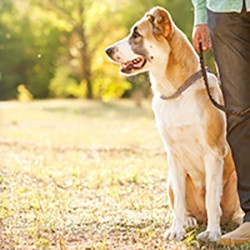 Few pet owners believe their dog is capable of biting another person. The truth is - dog bites are more common than you think. Each day in the U.S., dog bites cause over 2,000 injuries requiring medical attention.
Few pet owners believe their dog is capable of biting another person. The truth is - dog bites are more common than you think. Each day in the U.S., dog bites cause over 2,000 injuries requiring medical attention.
Dog bites aren't just common; they're also expensive. The average claim for a dog bite is $37,214 and dog bites accounted for more than one third of all homeowner liability claims paid in 2015.
Though the number of dog bites decreased from 2014 to 2015, the average cost per claim increased 16%. The Insurance Information Institute (I.I.I.) notes that the increase in claim costs can be attributed to not only dog bites, “but also to dogs knocking down children, cyclists, and the elderly, for example, all of which can result in fractures and other blunt force trauma injuries that impact the potential severity of the losses.”
The best way to avoid a dog bite claim is to prevent dangerous encounters between your dog and other individuals. That means identifying situations in which your dog may act out of character or aggressively and taking action to avoid them.
Here are a few simple tips from I.I.I. to greatly reduce your exposure to liability:
- Consult with a professional (e.g., veterinarian, animal behaviorist or responsible breeder) to learn about suitable breeds of dogs for your household and neighborhood.
- Spend time with a dog before buying or adopting it. Use caution when bringing a dog into a home with an infant or toddler. A dog with a history of aggression is inappropriate in a household with children.
- Keep the family dog secured if a stranger comes to your door.
- Be sensitive to cues that a child is fearful of or apprehensive about a dog and, if so, delay acquiring a dog. Never leave infants or young children alone with any dog.
- Socialize your dog so it knows how to act with other animals and people.
- Discourage children from disturbing a dog that is eating or sleeping.
- Be cautious when exposing your dog to new situations in which you are unsure of its response.
- Never approach a strange dog and always avoid eye contact with a dog that appears threatening.
- Immediately seek professional advice from veterinarians, animal behaviorists or responsible breeders if your dog develops aggressive or undesirable behaviors.
Most dogs are by nature friendly animals with kind demeanors. However, it is very easy for a dog to misinterpret a situation and act out of fear or confusion. Be honest with yourself about your dog's behavior and the likelihood that it could bite someone in certain situations. If you prepare for these situations in advance, you can manage the likelihood that they will occur and greatly reduce the possibility that you could be liable for a dog bite.




